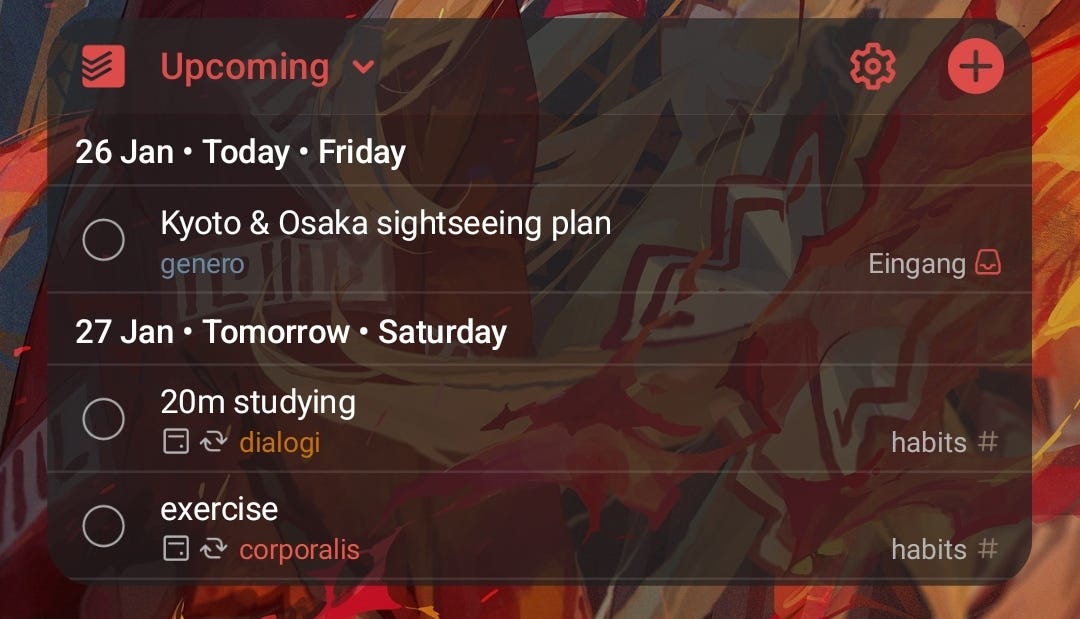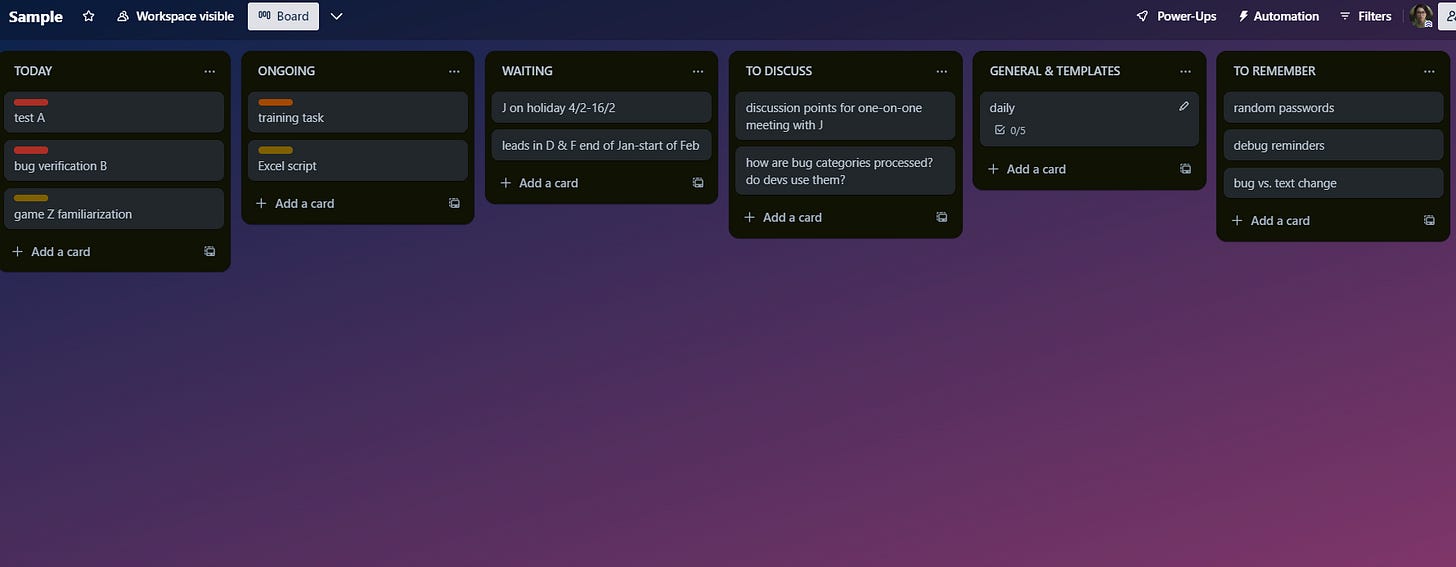Since starting a new job, I have struggled to make progress with personal projects outside of work. Fed up with my own laziness, I finally reexamined the way I keep track of tasks, habits, and projects to see what I could improve. What emerged is an updated productivity system that I hope will allow me to take back control.
My obsession with productivity began when I was a freelance translator looking for ways to squeeze more work into my day—since more work meant more money. Admittedly, it wasn't the most healthy motivation but books like Deep Work by Cal Newport and The Almanack of Naval Ravikant (plus Youtube) inspired me to optimize everything for success, from chores to relationships to learning new skills.
I started with practicing discipline. To me, discipline is about developing and maintaining attitudes that allow you to focus on what matters to you, in a sustainable way. Fortunately, focus is something I didn't have to learn as I have always been able to sink hours at a time into reading books.
My translation output didn't improve much but I learned something far more valuable: how to consistently achieve goals I had set for myself and how to learn hard but valuable skills.
I am probably not the best person to teach you discipline or comfort with stretching your mind--I was blessed with parents and teachers who always encouraged and enabled me learning whatever I was interested in1. However, I also enjoy finding and maintaining the best system to help me stay productive and organize my life. Over time, I have cycled through several iterations that helped me better understand what works and what doesn't.
Obligatory disclaimer: All of this is highly personal! Feel free to take what works for you and ignore the rest.
How to Stay Disciplined at Work
To be able to consistently focus on what matters, you have to approach all areas of life with the same discipline. If you are scattered and struggling in your job, you will hardly do better with your personal goals outside of work. This is why I organize my work and personal life in the same way, although I use different apps to do it.
At work, we use Trello so I created a private board to keep track of my day-to-day tasks. I also add meeting and discussion notes but if the Trello card gets so long that I have to scroll, I will move the content into a separate text file on my PC. My Trello board has six columns, inspired by Cal Newport.
Today: my daily task list
Ongoing: tasks in progress, most of which do not have a deadline
To discuss: questions and notes to discuss with other team members (mostly my supervisor)
Waiting: tasks I am waiting to hear back on or time-sensitive reminders, like when team members will be on holiday etc.
General & templates: only holds two cards so far, a template for repeating daily tasks that I can copy into the today column and a card with a list of things to do when work is slow
To remember: short notes I need to refer back to often—this is more convenient than a text file since Trello is always open in my browser
I also use labels so I can see at a glance which tasks are important: Red is for urgent or top priority tasks, orange is for semi-urgent tasks, and yellow is for tasks that are not urgent but still need to get done at some point. Only task cards get labels assigned to them.
The System
In my personal life, the foundation of my system are six categories that all tasks, projects, and notes can be sorted into. There is some overlap but not as much as I feared when I first started using it. Gratitude goes out to Rachael Stephen who invented this system—I adopted her categories, with the exception of Socialis (relationships) which I changed to Dialogi (learning). The app I use to organize my personal life is Todoist so I set up these categories as labels.
Divitiae (yellow): work and finances
Dialogi (orange): learning, e.g. Japanese language, tea ceremony, programming etc.
Corporalis (red): physical health, which encompasses diet and exercise
Domum (green): household and possessions
Genero (blue): creative activities and inspiration
Spiritus (violet): mental and spiritual health, self-care
What to Focus On
With a full-time job, I only have time and energy for one to two personal projects which I also track in Todoist. I came up with a cool-sounding name for each to make it more fun.
Glau Labs is writing
Silicon Duck is learning programming
One-time tasks that do not fit into one of these two go into the inbox but are still categorized by label.
My manuscripts, story notes, research, and all other project notes live in Obsidian, a note-taking app I use to plan and write fiction as well as nonfiction. I prefer Obsidian because it supports bidirectional linking, allowing me to easily connect notes and make associations between ideas. Let me know if you want to know more about my note-taking system!
Habits vs. Projects
The third project in my Todoist is called habits.
I have experimented with planning my days more rigorously but techniques such as calendar blocking or time batching have always felt too constricting. To me, deciding in advance how I'm going to spend each and every minute of my day takes all the fun and creativity out of it. At the same time, I learned that deciding what to do with my evening when I get home from work at 8pm leads to me just watching anime or gaming until it's time for bed. On weekends, I'm often exhausted from sightseeing or meeting friends during the day, which perpetuates the vicious cycle.
Since I want to dedicate some time to both writing and learning programming every day, I created daily habits for both projects:
Write for 20 minutes
Study for 20 minutes
My thought process for this was as follows:
Twenty minutes is low-effort enough to realistically complete every single day.
Both "writing" and "studying" are open-ended enough that I can fill in whatever story or study topic I most feel like tackling or which is most convenient on that particular day.
If I don't have a strong preference, I will default to my ongoing long-form story (at the moment, Requiem of the Moth) or my ongoing programming course (at the moment, an introduction to cybersecurity).
The only other daily habits are exercise as well as Anki reps2.
Top of Mind
As the only device I have with me at all times, my phone serves as a constant reminder of any outstanding daily tasks. How? The Todoist widget on my home screen shows the "Today" view. If I scroll to the left, I get to my running shopping list (the fourth and last project in Todoist) which I obviously also refer to a lot when out and about.

Your turn: How do you keep track of your tasks and projects? If you use a similar system, is it more or less structured? Are there differences in how you stay organized in your job vs. your personal life? I'd love to exchange approaches and tips in the comments!
If you wish you were more organized or productive but do not know where to start or what to focus on, perhaps the reading list below can provide some inspiration. Keep in mind that it took me years to find out what works for me. Again, take what you like and leave the rest!
Deep Work by Cal Newport
So Good They Can't Ignore You by Cal Newport
Deep Questions with Cal Newport (podcast)
The Almanack of Naval Ravikant by Eric Jorgenson
Ultralearning by Scott Young
Atomic Habits by James Clear
Grit by Angela Duckworth
Range by David Epstein
As a child, I tried violin, orchestra, tennis, horseback riding, chess, and hip hop dance. Only violin stuck with me but that's not important.
I use two decks to keep up with my Japanese: one for kanji, one for example sentences mined from various media, i.e. vocabulary







Thanks for this Vanessa, I struggle with a demanding career and other personal obligations that make solidifying a routine for non-monetized writing projects and habits tangential to a full life. Being flexible enough to create content in the interstitial spaces of my schedule and, as Tony Morrison said, write on the margins of the day, helps me accepts some of the facts of my life as it is today rather than become consumed with frustration. I also find over planning lacks that flexibility I need to allow the unplanned to occur without becoming morose and discontent. Also good to be reminded that prioritizing projects and habits are a necessity not a luxury, thanks again.
I loved this. Why did you decide to remove socialis? Im considering doing the same. I love your dialogi category! I might do that.
I also think it's smart that habits work for you more than time blocking. Im also bad at doing what's planned so i like the loose prompt to do whatever related to the project. I also like that you have a default habit to do for the domain if you arent inspired to do some other task within the domain.
Also, do you find it challenging to switch from writing to study time? Sometimes that mental switch from one domain to another can be hard for me. Im still experimenting.